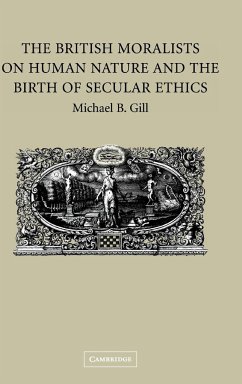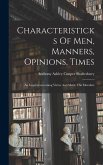Michael B. Gill
The British Moralists on Human Nature and the Birth of Secular Ethics
Michael B. Gill
The British Moralists on Human Nature and the Birth of Secular Ethics
- Gebundenes Buch
- Merkliste
- Auf die Merkliste
- Bewerten Bewerten
- Teilen
- Produkt teilen
- Produkterinnerung
- Produkterinnerung
This 2006 volume uncovers the historical roots of naturalistic, secular contemporary ethics.
Andere Kunden interessierten sich auch für
![The British Moralists and the Internal 'Ought' The British Moralists and the Internal 'Ought']() Stephen L. DarwallThe British Moralists and the Internal 'Ought'108,99 €
Stephen L. DarwallThe British Moralists and the Internal 'Ought'108,99 €![British Moralists British Moralists]() Lewis Amherst Selby-BiggeBritish Moralists37,99 €
Lewis Amherst Selby-BiggeBritish Moralists37,99 €![British Moralists V2 British Moralists V2]() British Moralists V237,99 €
British Moralists V237,99 €![The Secular Saints The Secular Saints]() Hunter LewisThe Secular Saints13,99 €
Hunter LewisThe Secular Saints13,99 €![Characteristicks Of Men, Manners, Opinions, Times: An Inquiryconcerning Virtue And Merit. The Moralists Characteristicks Of Men, Manners, Opinions, Times: An Inquiryconcerning Virtue And Merit. The Moralists]() Characteristicks Of Men, Manners, Opinions, Times: An Inquiryconcerning Virtue And Merit. The Moralists36,99 €
Characteristicks Of Men, Manners, Opinions, Times: An Inquiryconcerning Virtue And Merit. The Moralists36,99 €![Mobilizing Traditions in the First Wave of the British Animal Defense Movement Mobilizing Traditions in the First Wave of the British Animal Defense Movement]() Chien-hui LiMobilizing Traditions in the First Wave of the British Animal Defense Movement98,99 €
Chien-hui LiMobilizing Traditions in the First Wave of the British Animal Defense Movement98,99 €![The Classical Moralists The Classical Moralists]() Benjamin RandThe Classical Moralists43,99 €
Benjamin RandThe Classical Moralists43,99 €-
-
-
This 2006 volume uncovers the historical roots of naturalistic, secular contemporary ethics.
Produktdetails
- Produktdetails
- Verlag: Cambridge University Press
- Seitenzahl: 368
- Erscheinungstermin: 1. Juli 2016
- Englisch
- Abmessung: 235mm x 157mm x 26mm
- Gewicht: 747g
- ISBN-13: 9780521852463
- ISBN-10: 0521852463
- Artikelnr.: 22696798
- Herstellerkennzeichnung
- Libri GmbH
- Europaallee 1
- 36244 Bad Hersfeld
- gpsr@libri.de
- Verlag: Cambridge University Press
- Seitenzahl: 368
- Erscheinungstermin: 1. Juli 2016
- Englisch
- Abmessung: 235mm x 157mm x 26mm
- Gewicht: 747g
- ISBN-13: 9780521852463
- ISBN-10: 0521852463
- Artikelnr.: 22696798
- Herstellerkennzeichnung
- Libri GmbH
- Europaallee 1
- 36244 Bad Hersfeld
- gpsr@libri.de
Michael Gill is assistant professor at the University of Arizona. He has written on the history of ethics, contemporary meta-ethics, and biomedical ethics, and has contributed to The Journal of the History of Philosophy, Hume Studies, Journal of Medicine and Philosophy, and The Kennedy Institute of Ethics Journal, among other publications.
Introduction
Part I. Whichcote and cudworth: 1. The negative answer of English Calvinism
2. Whichcote and Cudworth's positive answer
3 Whichcote and Cudworth on religious liberty
4. Rationalism, sentimentalism, and Ralph Cudworth
5. The emergence of non-Christian ethics
Part II. Shaftesbury: 6. Shaftesbury and the Cambridge Platonists
7. Shaftesbury's Inquiry: a misanthropic faith in human nature
8. The Moralists, a Philosophical Rhapsody
9. A philosophical faultline
Part III. Hutcheson: 10. Early influences on Francis Hutcheson
11. Hutcheson's attack on egoism
12. Hutcheson's attack on moral rationalism
13. A Copernican positive answer, an attenuated moral realism
14. Explaining away vice
Part IV. Hume: 15. David Hume's new 'science of man'
16. Hume's arguments against moral rationalism
17. Hume's associative moral sentiments
18. Hume's progressive view of human nature
19. Comparison and contingency in Hume's moral account
20. What is a Humean account, and what difference does it make?
Part I. Whichcote and cudworth: 1. The negative answer of English Calvinism
2. Whichcote and Cudworth's positive answer
3 Whichcote and Cudworth on religious liberty
4. Rationalism, sentimentalism, and Ralph Cudworth
5. The emergence of non-Christian ethics
Part II. Shaftesbury: 6. Shaftesbury and the Cambridge Platonists
7. Shaftesbury's Inquiry: a misanthropic faith in human nature
8. The Moralists, a Philosophical Rhapsody
9. A philosophical faultline
Part III. Hutcheson: 10. Early influences on Francis Hutcheson
11. Hutcheson's attack on egoism
12. Hutcheson's attack on moral rationalism
13. A Copernican positive answer, an attenuated moral realism
14. Explaining away vice
Part IV. Hume: 15. David Hume's new 'science of man'
16. Hume's arguments against moral rationalism
17. Hume's associative moral sentiments
18. Hume's progressive view of human nature
19. Comparison and contingency in Hume's moral account
20. What is a Humean account, and what difference does it make?
Introduction
Part I. Whichcote and cudworth: 1. The negative answer of English Calvinism
2. Whichcote and Cudworth's positive answer
3 Whichcote and Cudworth on religious liberty
4. Rationalism, sentimentalism, and Ralph Cudworth
5. The emergence of non-Christian ethics
Part II. Shaftesbury: 6. Shaftesbury and the Cambridge Platonists
7. Shaftesbury's Inquiry: a misanthropic faith in human nature
8. The Moralists, a Philosophical Rhapsody
9. A philosophical faultline
Part III. Hutcheson: 10. Early influences on Francis Hutcheson
11. Hutcheson's attack on egoism
12. Hutcheson's attack on moral rationalism
13. A Copernican positive answer, an attenuated moral realism
14. Explaining away vice
Part IV. Hume: 15. David Hume's new 'science of man'
16. Hume's arguments against moral rationalism
17. Hume's associative moral sentiments
18. Hume's progressive view of human nature
19. Comparison and contingency in Hume's moral account
20. What is a Humean account, and what difference does it make?
Part I. Whichcote and cudworth: 1. The negative answer of English Calvinism
2. Whichcote and Cudworth's positive answer
3 Whichcote and Cudworth on religious liberty
4. Rationalism, sentimentalism, and Ralph Cudworth
5. The emergence of non-Christian ethics
Part II. Shaftesbury: 6. Shaftesbury and the Cambridge Platonists
7. Shaftesbury's Inquiry: a misanthropic faith in human nature
8. The Moralists, a Philosophical Rhapsody
9. A philosophical faultline
Part III. Hutcheson: 10. Early influences on Francis Hutcheson
11. Hutcheson's attack on egoism
12. Hutcheson's attack on moral rationalism
13. A Copernican positive answer, an attenuated moral realism
14. Explaining away vice
Part IV. Hume: 15. David Hume's new 'science of man'
16. Hume's arguments against moral rationalism
17. Hume's associative moral sentiments
18. Hume's progressive view of human nature
19. Comparison and contingency in Hume's moral account
20. What is a Humean account, and what difference does it make?









